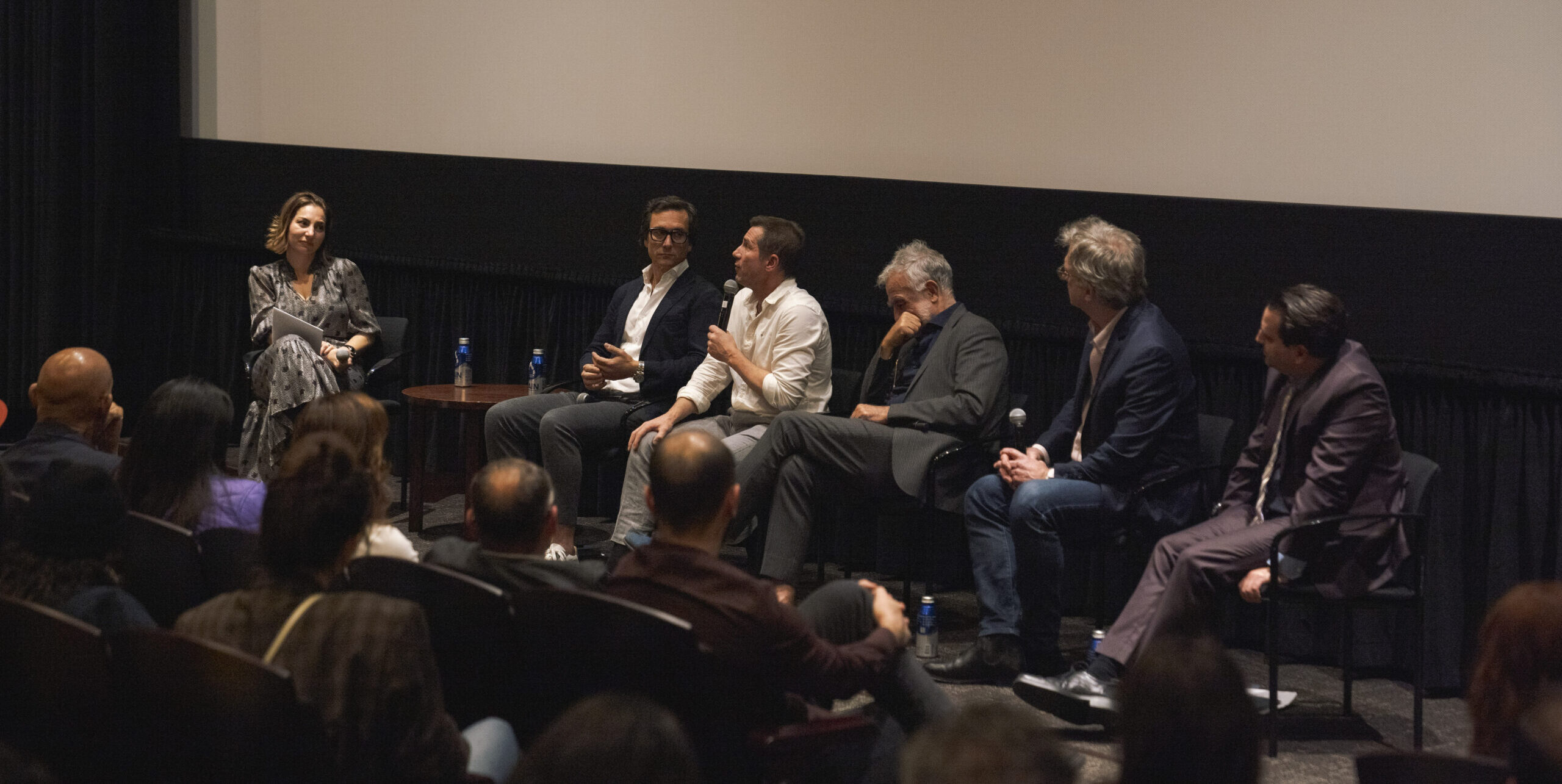On December 5, the USC Dornsife Institute of Armenian Studies, in collaboration with the USC School of Cinematic Arts and Variance Films, hosted a sold-out theatrical screening and panel discussion of Amerikatsi, Armenia’s official Oscar submission for Best International Film.
Due to an overwhelmingly large turnout, the USC School of Cinematic Arts held an additional screening in another room to accommodate the overflow.
The screening was followed by a discussion with Michael A. Goorjian, the film’s writer, director, and lead actor, and Patrick Malkassian, producer, in conversation with Luis Moreno Ocampo, Founding Prosecutor of the International Criminal Court, Ted Braun, USC Joseph Campbell Endowed Chair in Cinematic Ethics, and Steve Swerdlow, Esq., USC Associate Professor of the Practice of Human Rights. Dr. Shushan Karapetian, Director of the USC Dornsife Institute of Armenian Studies, introduced and moderated the discussion.
 In her opening remarks, Dr. Karapetian highlighted the “rare and beautiful opportunity of being witness to dialogue between such invested and powerful voices, who may never have appeared in the same environment together otherwise.”
In her opening remarks, Dr. Karapetian highlighted the “rare and beautiful opportunity of being witness to dialogue between such invested and powerful voices, who may never have appeared in the same environment together otherwise.”
The panelists provided an insightful analysis of the film’s universal themes of hope and belonging and the importance of giving voice to Armenian narratives for a global audience.
Amerikatsi tells the story of Charlie, an Armenian-American who moves to Soviet Armenia in 1948 in hopes of finding a connection to his roots but instead finds a country crushed under Stalin’s rule. After being unjustly imprisoned, Charlie falls into despair until he discovers that he can see into a nearby apartment from his cell window – the home of a prison guard, Tigran. As his life unexpectedly becomes entwined with the guard’s, he begins to see that the true spirit of his homeland is alive in its people.
For Michael Goorjian, making this film was an exploration of his identity as a filmmaker and an Armenian-American who had a desire to create something not limited by the experience of Genocide. Goorjian stated that this “film did not have to be about an Armenian at all.” He first heard the story that inspired the film from a Ukrainian friend who knew a man that could see into an apartment building from his prison cell.
“Whether you are Greek or Italian, the exploration of your identity is a shared experience,” said producer Patrick Malkassian. In response to Dr. Karapetian’s inquiry about narrative scarcity, Malkassian described the difficulty of making a film about a group of people whose stories and narratives are historically overlooked.

Commenting on Goorjian’s nuanced portrayal of the moral dilemmas faced by all the characters, Professor Braun stated, “By allowing us to empathize not just with Charlie, but also with Tigran the prison guard who is equally a captive, you help us understand how impossible the conflicting moral imperatives are, and you do it in a way that allows us to feel the humanity within all of the people trapped in this system…The film humanizes the perpetrator; that is the only way out. Because if you demonize the perpetrator, you repeat the cycle.”
Steve Swerdlow drew parallels to Charlie’s experience in a Stalin-era prison with that of prisoners currently being held in Azerbaijan, including Armenians abducted from Artsakh (Nagorno-Karabakh) and outspoken Azerbaijani journalists who are currently being tried for trumped-up charges in kangaroo courts.
 Luis Moreno Ocampo, who was the first to blow the whistle about Aliyev’s authoritarian regime committing genocide in Artsakh, emphasized the need to engage a wider audience in the fight for prisoners in Azerbaijan, stating: “We need to talk about Armenia, if we talk about genocide our audience is small, but if we talk about this movie and the Oscar, the audience will be much bigger, and then we can talk about rescuing the 55 prisoners in Azerbaijan. You cannot go to Azerbaijan to rescue them, but you can support this film’s Oscar nomination. Your movie, Michael, is giving us an opportunity, because as I’ve learned, the more massive the demand, the easier it is to solve the problem.”
Luis Moreno Ocampo, who was the first to blow the whistle about Aliyev’s authoritarian regime committing genocide in Artsakh, emphasized the need to engage a wider audience in the fight for prisoners in Azerbaijan, stating: “We need to talk about Armenia, if we talk about genocide our audience is small, but if we talk about this movie and the Oscar, the audience will be much bigger, and then we can talk about rescuing the 55 prisoners in Azerbaijan. You cannot go to Azerbaijan to rescue them, but you can support this film’s Oscar nomination. Your movie, Michael, is giving us an opportunity, because as I’ve learned, the more massive the demand, the easier it is to solve the problem.”
“Responding as an artist, in a time like this with something that can reach people, is in many ways the most profound and important thing that you can do,” Braun said about the exodus from Artsakh and artistic response.
The overflowing theater and engaged audience are proof of the film’s unique ability to reach across borders and boundaries, surpass language barriers, and deliver a human story of resilience and capacity for hope.
“Film has the power to transform how we look at people, things, events, places, and historical narratives we have taken for granted. It has the power to shape global perceptions and actions. The Institute is committed to bringing essential and pressing conversations to audiences in Los Angeles and beyond,” stated Dr. Karapetian.









